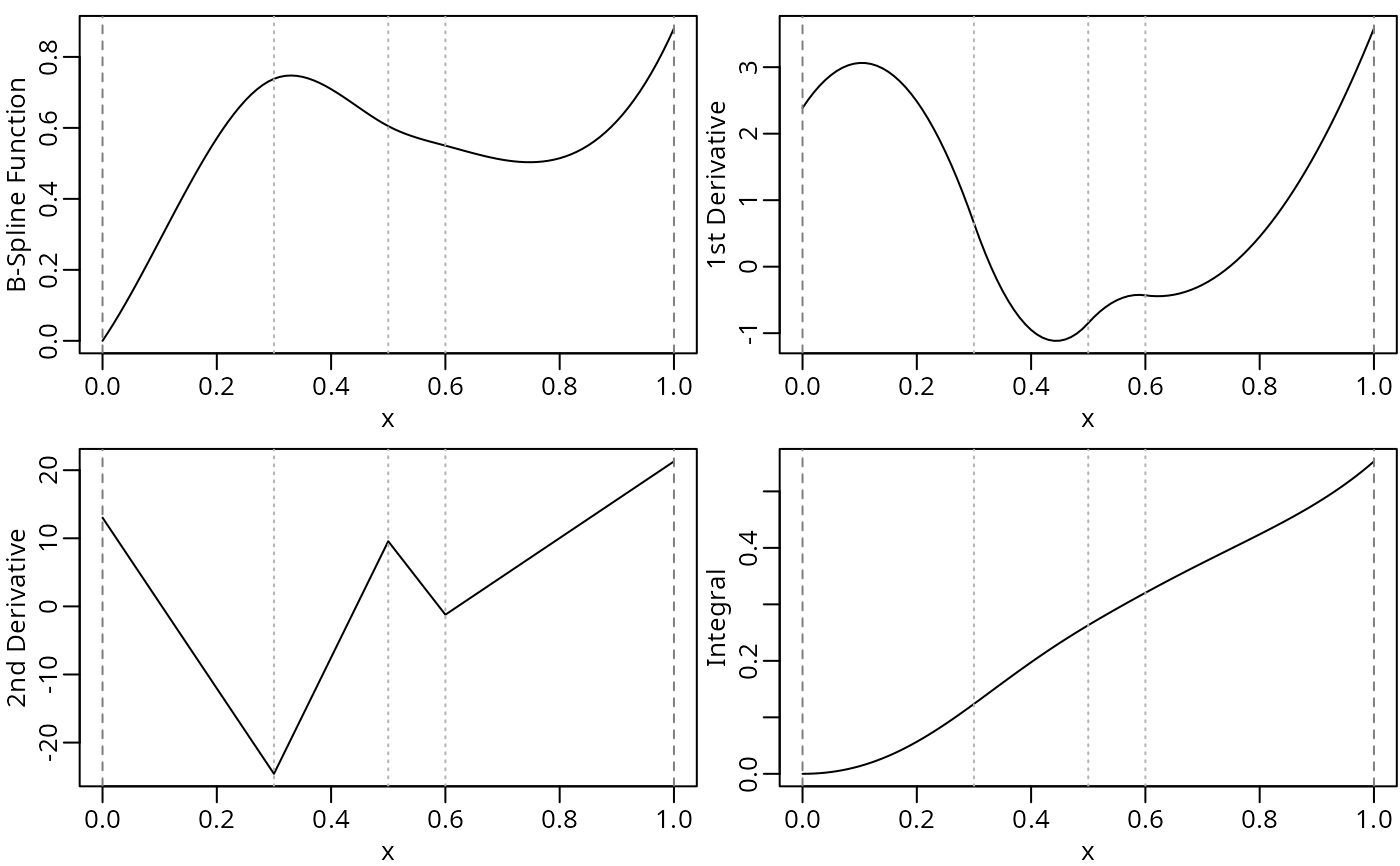Returns the spline function (with the specified coefficients) or evaluate
the basis functions at the specified x if the coefficients are not
specified.
Usage
# S3 method for class 'BSpline'
predict(object, newx = NULL, coef = NULL, ...)
# S3 method for class 'MSpline'
predict(object, newx = NULL, coef = NULL, ...)
# S3 method for class 'ISpline'
predict(object, newx = NULL, coef = NULL, ...)
# S3 method for class 'CSpline'
predict(object, newx = NULL, coef = NULL, ...)
# S3 method for class 'BernsteinPoly'
predict(object, newx = NULL, coef = NULL, ...)
# S3 method for class 'NaturalSpline'
predict(object, newx = NULL, coef = NULL, ...)
# S3 method for class 'NaturalSplineK'
predict(object, newx = NULL, coef = NULL, ...)Arguments
- object
Spline objects produced by the
splines2package.- newx
The
xvalues at which evaluations are required. If it isNULL(by default), the originalxused to create the spline object will be used.- coef
A numeric vector specifying the coefficients of the spline basis functions. If it is
NULL(by default), the spline basis functions will be returned. Otherwise, the resulting spline function will be returned.- ...
Other options passed to the corresponding function that constructs the input
object. For example, the additional options will be passed tobSpline()for aBSplineobject.
Value
The function returns the spline basis functions with the new values
of x if coef is not specified. Otherwise, the function
returns the resulting spline function (or its derivative if
derivs is specified as a positive integer through ...).
Examples
library(splines2)
x <- seq.int(0, 1, 0.2)
knots <- c(0.3, 0.5, 0.6)
newx <- seq.int(0.1, 0.9, 0.2)
## Cubic B-spline basis functions
bs_mat <- bSpline(x, knots = knots)
## compute the B-spline basis functions at new x
predict(bs_mat, newx)
#> 1 2 3 4 5 6
#> [1,] 0.5392593 0.15333333 0.011111111 0.000000e+00 0.000000 0.000000
#> [2,] 0.1600000 0.54000000 0.300000000 4.072784e-48 0.000000 0.000000
#> [3,] 0.0000000 0.05555556 0.753968254 1.904762e-01 0.000000 0.000000
#> [4,] 0.0000000 0.00000000 0.192857143 5.496429e-01 0.241875 0.015625
#> [5,] 0.0000000 0.00000000 0.007142857 1.203571e-01 0.450625 0.421875
## compute the B-spline function for the specified coefficients
beta <- runif(ncol(bs_mat))
predict(bs_mat, coef = beta)
#> [1] 0.0000000 0.5708690 0.7091796 0.5499994 0.5144477 0.8802465
## compute the first derivative of the B-spline function
predict(bs_mat, coef = beta, derivs = 1)
#> [1] 2.3872603 2.4854897 -0.9511306 -0.4309568 0.4505289 3.5825490
## or equivalently
predict(deriv(bs_mat), coef = beta)
#> [1] 2.3872603 2.4854897 -0.9511306 -0.4309568 0.4505289 3.5825490
## compute the second derivative
predict(bs_mat, coef = beta, derivs = 2)
#> [1] 13.030248 -12.047953 -7.510345 -1.218908 10.033764 21.286437
## or equivalently
predict(deriv(bs_mat, derivs = 2), coef = beta)
#> [1] 13.030248 -12.047953 -7.510345 -1.218908 10.033764 21.286437
## compute the integral
predict(bs_mat, coef = beta, integral = TRUE)
#> [1] 0.00000000 0.05675947 0.19745372 0.32047678 0.42398320 0.55301255
## or equivalently
predict(update(bs_mat, integral = TRUE), coef = beta)
#> [1] 0.00000000 0.05675947 0.19745372 0.32047678 0.42398320 0.55301255
## visualize
op <- par(mfrow = c(2, 2), mar = c(2.5, 2.5, 0.5, 0.1), mgp = c(1.5, 0.5, 0))
plot(bs_mat, coef = beta, ylab = "B-Spline Function", mark_knots = "all")
plot(deriv(bs_mat), coef = beta, ylab = "1st Derivative", mark_knots = "all")
plot(deriv(bs_mat, derivs = 2), coef = beta,
ylab = "2nd Derivative", mark_knots = "all")
plot(update(bs_mat, integral = TRUE), coef = beta,
ylab = "Integral", mark_knots = "all")
 par(op)
par(op)